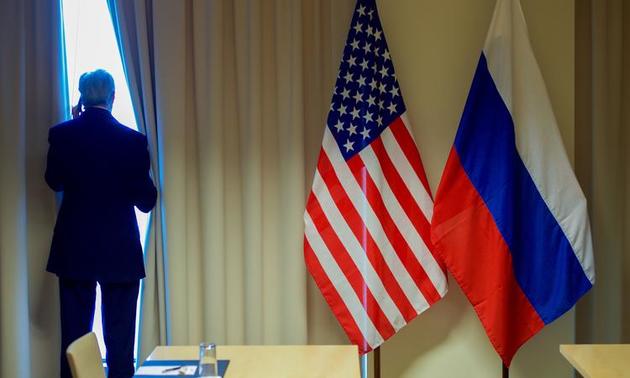The United States has banned the sale of defense technology to Russia and lending to Russian companies. What harm will these restrictions cause to the military-industrial complex and the Russian economy, Vestnik Kavkaza discussed together with military expert Alexander Artamonov and economist Anton Shabanov.
Personal sanctions
The United States imposed sanctions on Russia in connection with the Navalny case. The US Treasury's sanctions list is long. First, it included Russian officials: Deputy Head of the Presidential Administration Sergei Kiriyenko, FSB Director Alexander Bortnikov, Deputy Defense Ministers Alexei Krivoruchko and Pavel Popov, FSIN Director Alexander Kalashnikov, Prosecutor General Igor Krasnov and Head of the President's Internal Policy Department Andrei Yarin. The assets of these individuals are frozen, and US citizens are prohibited from doing business with them.
The European Union also introduced personal sanctions. The list of the EU Council includes: Head of the Investigative Committee Alexander Bastrykin, Prosecutor General Igor Krasnov, Director of Rosgvardia Viktor Zolotov and Director of the Federal Penitentiary Service Alexander Kalashnikov. They are banned from entering the EU, their banking assets in the EU will be frozen. The aforementioned sanctions are being imposed by the US and the EU, it is assumed, against persons associated with the criminal term of Alexei Navalny.
Defense Industry Sanctions
Also, the entire defense industry of Russia was under US sanctions. The department made changes to section 126.1 of the regulation on international arms trade: from now on, the Russian Federation is included in the list of countries to which it is prohibited to export defense technologies, with the exception of the space industry.
Military columnist for the weekly Zvezda, Alexander Artamonov, doubts the effectiveness of sanctions against the Russian defense industry. "The sanctions imposed on Russia cannot achieve their goal in any way. Russia does not acquire from the United States any products related to the production of defense technologies, since in this area there is a policy of ensuring its own sovereignty through the self-sufficiency of the military-industrial cycle," he said in an interview with "Vestnik Kavkaza".
US sanctions were imposed in agreement with European partners. Repetition of the Americans, according to Artamonov, proves that the EU has once again "signed the final demise of its independent diplomacy." It is worth noting that Turkey has already fallen under similar US sanctions in the defense industry. The behavior of Turkish President Recep Tayyip Erdogan, who fiercely rebuffed the United States, can be an example of how to respond to such attacks.
"The countermeasures promised by Foreign Minister Sergei Lavrov would have been better carried out in the key of Erdogan, who, even if he does not possess all the might of our great country, but even at the level of a regional power, without hesitation, on occasion explains to the United States what to do and where to go," the military expert emphasized.
Prohibition of doing business and lending
A separate layer of sanctions concerns companies associated with the production and proliferation of weapons of mass destruction, in particular, Novichok, which, according to the US and EU authorities, was poisoned by Alexei Navalny. The US Department of Commerce lists nine Russian companies: Himmed, Femteko, Interlab, Labinvest, Analit Products, Intertech Instruments, Pharmcontract, Rau Pharm and Regionsnab. Along with them, the "black list" includes the German "Himconnect", "Pharmcontract" and "Riol-Chemi", as well as the Swiss "Himconnect".
The United States has also banned US financial institutions from lending to Russia. The sanctions will affect "any loans, loan guarantees or other financial assistance from any department, department or structure of the US government, including the US Export-Import Bank," said US Secretary of State Anthony Blinken.
Anton Shabanov, head of the Otkritie Broker investment products block, believes that financial restrictions will not have a tangible impact on the Russian economy. "I would not say that these are directly some new sanctions that will greatly harm the Russian economy or the ruble. The ban will affect loans, guarantees and financial assistance from only US government agencies. Private structures with restrictions imposed by other sanctions do not matter. can subsidize Russia, "says the economist.
Shabanov drew attention to the fact that the US authorities have not subsidized the Russian government since the 1990s. “Nothing will change globally. The news about the 'new sanctions' sounds nice, but if you dig a little inside, there is nothing global there. Therefore, no hypernova impacts on the Russian economy are foreseen. But it’s not necessary to say that it will turn the whole world upside down, ”the expert added.
The behavior of the ruble also speaks of the insignificant impact of US and EU sanctions on the Russian economy. Its rate, against the background of certainty about new restrictive measures on the evening of March 2, continued to rise both against the dollar and the euro. According to the Moscow Exchange, the dollar fell by 46 kopecks, to 73.71 rubles, and the euro rate - by 24 kopecks, to 89.08 rubles.






